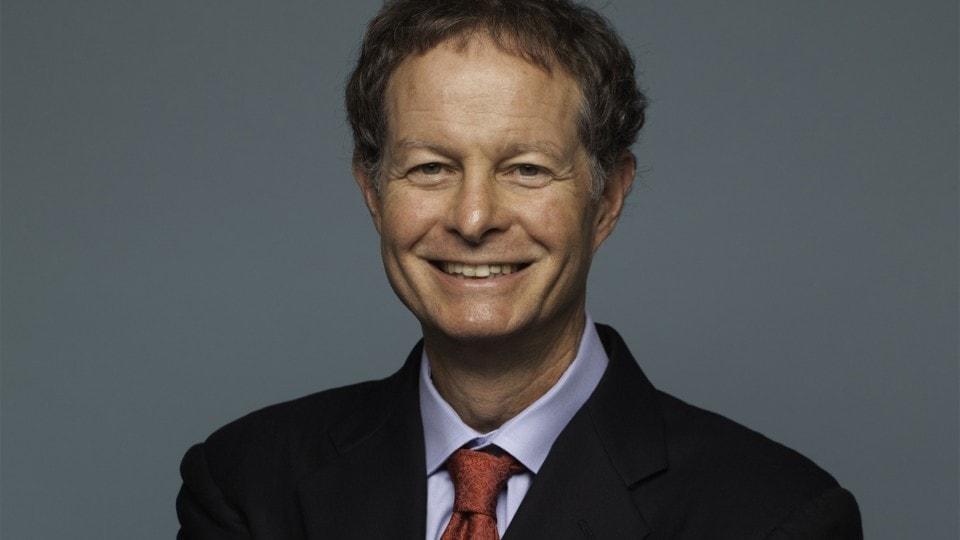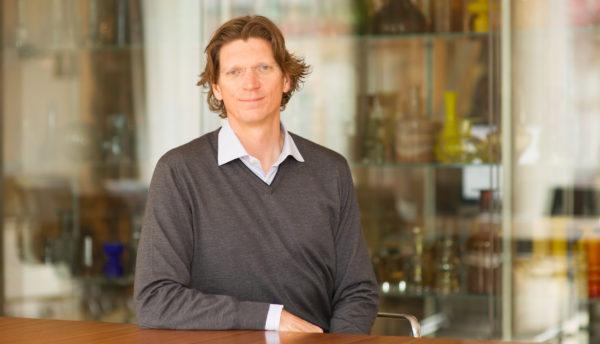24Aug2018
About John Mackey
John Mackey, co-founder and co-CEO of Whole Foods Market, has taken the natural and organic grocer from a single store in Austin, Texas in 1978, to a $15.7 billion Fortune 500 company and a top U.S. supermarket. In 1981, Austin’s worst flood in history almost bankrupted the original store, and community efforts to save it shaped his leadership philosophy to “do right by your stakeholders and they’ll do right by you.”
While devoting his entire career to providing shoppers with high quality natural and organic foods, John has also focused on building a more conscious way of doing business. He led the company through more than 20 acquisitions, took Whole Foods Market public in 1992, and plans to grow to the company to 1,200 stores. Most recently, John has focused on returning to the company’s roots around healthy eating and lifestyle choices. A staunch advocate of healthy eating education, he laid the foundation for health and wellness programs for team members and customers.
A strong believer in free market principles, John co-founded the Conscious Capitalism Movement to challenge business leaders to rethink why their organizations exist and to acknowledge their important roles in creating value for all of their stakeholders in the interdependent global marketplace. This new business paradigm holds the potential for enhancing corporate performance while also advancing the quality of life for billions of people. He co-authored a New York Times and Wall Street Journal bestselling book entitled Conscious Capitalism: Liberating the Heroic Spirit of Business to boldly defend and re-imagine capitalism while encouraging others to implement this way of doing business that is grounded in ethical consciousness. We sat down with John to discuss his upcoming session at Nordic Business Forum 2018 entitled, “Conscious Capitalism: How Purpose Can Affect Stakeholder Integration, Leadership, and Culture”.
Speaker Spotlight Interview
Nordic Business Forum: Hi John! Thanks for speaking with us today. Let’s start with the subject of your keynote session: What is “conscious capitalism” and how is it different from regular capitalism?
John Mackey: The most simple answer is that conscious capitalism means doing business in a more conscious way. And if you dive deeper into that, what does that mean, doing business in a different way? We’ve kind of centered the philosophy around four pillars, and the first pillar is, every business has the potential for a higher purpose that goes beyond only seeking to maximize shareholder value and profits. So it’s not opposed to making money, but it doesn’t make that the center of the business and why it exists. And I’ll often use an analogy that, my body makes red blood cells and if I stop making red blood cells, I would die. But it doesn’t follow from that that the purpose of my life is to make red blood cells. Similarly, business has to make a profit or it’ll die, and it doesn’t necessarily follow that, therefore, that’s the purpose of why the business exists. So, business is about value creation just like every other profession is about value creation. Doctors, at least in America, are very well-paid, but they’re not trying to maximize their profits so much as they’re trying to heal people. That’s the purpose of the doctor. Teachers educate. Architects design. Building engineers construct things. So each of the professions refers back to some type of value creation it’s doing for other people, and business, which is the greatest value creator in the world, is unfairly put in a box, generally, that it’s just about making money. So first principle or first pillar is that business has this potential, every business does, for a purpose that goes beyond just making money.
Secondly, that a business creates value for more than just its shareholders and the owners. And so it has a multiplicity of stakeholders which are interdependent. So a typical business will have customers, a stakeholder, you have employees, you have suppliers, you have investors or owners, and you have communities that we’re part of. Each of those stakeholders are connected together. So the conscious business, the conscious capitalism is about consciously creating value, or optimizing value creation for each of those interdependent stakeholders, so that it’s seeing that managing the business more from a system’s perspective in order to optimize the overall system, and in believing in doing that, it will create the most long-term value for all the stakeholders including the owners or the investors.
Third, it’s a different philosophy of leadership, what we call conscious leadership. And so the conscious leader is not seeking to maximize his or herself – it’s not a self-aggrandizement that basically says “I’m the CEO. I’m the leader. I’m going to get as much money as I can get. I’m going to run this business basically to benefit me the most.” It’s a different philosophy. It’s more of a servant-type leadership where this leader is aligned with the higher purpose of the business or the organization and attempting to serve that higher purpose. This leader is attempting to serve all the stakeholders, attempting to optimize value creation for all of those interdependent stakeholders. So it’s a different kind of leadership. It’s less ego-driven and more service-oriented.
And the fourth pillar is about culture. That the conscious business realizes that creating a culture that allows human beings that work there and also interact with the business to have a type of work environment that allows people to self-actualize themselves, to fulfill themselves, they’re not just sort of cogs in the machine, they’re human beings with a complexity of needs and desires. And the conscious business sees that humans aren’t just resources for the businesses, but they’re living beings with high-complex motivations and desires, and the businesses should be managed in such a way that it creates a community of people that allows those people to learn and grow and flourish.
So those are the four pillars of conscious capitalism. And that’s how it’s different from other businesses. But it’s on a continuum, right? Every business could have some sense of purpose, every business could have an inkling of stakeholders. The conscious business, the conscious capitalism, is simply thought through maybe a little bit deeper and is attempting to put these pillars into practice to realize it on a deeper level. And so, if you’re conscious, you’re on a continuum. It’s not like you just one day wake up and now you’re conscious. Conscious is a type of awareness and as we become more conscious of purpose, of stakeholders, of culture, of leadership, we can be more effective in creating businesses that are more successful and allow people to flourish. It’s just being more conscious in all these different aspects of the business.
NBForum: If leaders are put into a position that has authority in a regular capitalist ecosystem, can they change a company into a conscious capitalist organization?
JM: They can. It’s hard work. It’s not a bottom-up revolution for the most part. It’s more of a top-down type revolution. So every organization’s going to have a culture to it, and to change a culture is difficult. It can be done but it’s not easy because cultures, they generally evolve over long periods of time. And there are certain habits that are formed, certain ways of thinking, certain values, and changing that is very difficult. It’s much easier to start a conscious business from the very beginning when it doesn’t have any bad habits to overcome. But it can be done but it requires visionary leadership at the top. You won’t be able to carry out a bottom-up revolution because the leadership above will squash it if they’re not aligned with it. It requires particularly the CEO to become more conscious or a leader comes in who’s more conscious. And then he or she can work on the team, but someone who also shares their values and visions. And then they can begin to transform the culture and values of the company and make it more conscious. But it requires that kind of top senior leadership buy-in or nothing is going to change.
NBForum: Absolutely. Do you think purpose and internal drive are teachable concepts to employees and new hires?
JM: I think purpose is definitely teachable and it’s an attractor. In my lifetime, I’ve really known hundreds of entrepreneurs. And with only a few exceptions when I say those entrepreneurs weren’t animated by some type of passion, something they were trying to do in the world, they weren’t primarily in it to just make as much money as possible. Not that they were opposed to that, but that’s not what’s firing them up. They’re passionate about something that they want to do in the world, something they want to create. And so the business is started with the fuel or the passion of that entrepreneur. Now, their degree of consciousness can vary tremendously. Most entrepreneurs initially they’re just on fire and they just lead and they create a business organization around them, and the best of those entrepreneurs will begin to take their– they become more conscious of what’s driving them and what their own personal higher purpose is in creating the business, and they’ll begin to make that explicit and make it more conscious within the organization. But many do not. And the organization sticks around long enough, that founder will move on and you’ll have a different kind of leadership come in who will be seeking something new. Particularly if it’s a public company, they will begin to feel a lot of pressure to make more money, to drive the stock price up, to keep the investors happy and for them to get bigger bonuses.
And so that initial higher purpose that the entrepreneur had is still there in the DNA of the organization, it’s just been forgotten or covered over. So, oftentimes, if new leadership comes in that’s more conscious, they don’t have to go out and create this new higher purpose out of nothing. It’s there in the DNA of the company. They have to go find it. They have to go on a purpose search to search for it, and then they have to reawaken it and they have to make it more explicit. So it’s not an easy task but it can be done and I’ve seen it done. And so I’ve seen that purpose has almost upped the ante to be in the game because increasingly, you’re competing against businesses that have this higher purpose, that are getting people committed to that purpose. And once you get that purpose fired up, then it begins to attract people to it. It’s magnetic. It begins to attract its own kind that sort of align with it. And the culture of the business begins to evolve based simply on that purpose being rediscovered or manifested. So yes, you do hire for purpose but more importantly, cultures attract people who align with the purpose and you begin to build momentum. The hardest thing is to get that momentum going because you’ll have an existing culture that may resist it, so you definitely have to have that visionary leadership to try to lead the culture and evolve the culture and they need help to do it. They can’t do it by themselves.
NBForum: Speaking of culture and evolving companies, especially where purpose is concerned, do you think that hiring different talents and perspectives that may not be a “cultural fit” for the company dilute or detract from the purpose or would it reinforce it?
JM: Every business is faced with the challenge of evolving versus stability and you need both. If you are stable but not evolving, if you just hire for fit, cultural fit, then if you’re not evolving, then ultimately you’ll probably fail. Because the world’s evolving and you need to evolve along with it or you’ll be left behind. So I think it’s important that you hire for both, promote with both. Sometimes, I know at Whole Foods Market, we’ve done both and we do hire for cultural fit but if you promote strictly from within, you’re not going to get any challenges to the culture. The cultural immune system will begin to stagnate or become rigid, so you need to hire some from the outside, particularly at the executive level, who aren’t locked into the culture, who are good cultural fits but are also bringing fresh eyes into the organization, into the company. They see things that the existing culture doesn’t see because they’re blind to it. Because they’re just sort of used to it. In fact, without going into it too much, I have experienced that personally now that Amazon has bought Whole Foods. It’s been 12 months since we announced the deal and 10 months since we actually merged. And so I’m coming into Amazon looking at their culture and I’m both inspired by it and, at the same time, I recognize things that the people that have been there a long time don’t see any longer. I bring a fresh perspective, which, hopefully, will add value to Amazon over time and they’re surely adding value to Whole Foods.
So then, on the whole purpose question, you need to hire for stability and for evolution. And purpose evolves too but, usually, it just gets deeper, it gets more complex. Whole Foods’ original purpose from 40 years ago was simply to sell healthy food to people, earn a living, and have fun. Those three all still exist. So they’re 40 years and they’re still there, but the purpose is deeper. Our mission has expanded because we started with one store, right? And now we’re a $17 billion corporation with 90,000 people working for the company, so we’ve evolved it but kept a continuity to it as well. I think, when you bring new leadership in, they’re going to sync up with the culture. You want them to sync up with the culture and you want them to sync up with the purpose, but it’s sometimes necessary that both of those over time evolve while keeping a continuity with who they were in the past. That’s not that easy to do but that’s kind of what’s called for today in business, hence why I think conscious capitalism is an important movement.
NBForum: One final question… What is one thing you want people to learn from you?
JM: Business is good and it can be better.
About Nordic Business Forum 2018
Nordic Business Forum will host its 9th annual business and leadership conference by the same name in Helsinki on the 26th and 27th of September 2018 for 7,500 C-level executives and business owners. Our 2018 main event will bring to the stage some of the world’s preeminent experts on strategy, artificial intelligence, and peak performance for two action-packed days.
NBForum 2018 is a place where you will uncover strategic success principles, discover how to apply new technologies to win in business, and learn how to drive and sustain personal performance. It’s also THE place to network and drive business development. The networking opportunities presented by our guests are unparalleled in the Nordics. You’re getting more than just a conference ticket — you’re getting access to some of the greatest business minds on the planet!
Nordic Business Forum is Europe’s leading conference organizer with events in Finland, Sweden, and Norway. Our 2018 event is sold out, but you can tune in to the event from anywhere in the world with our live stream licenses, which are tailored to individuals and groups (communities).

 by:
by: 
